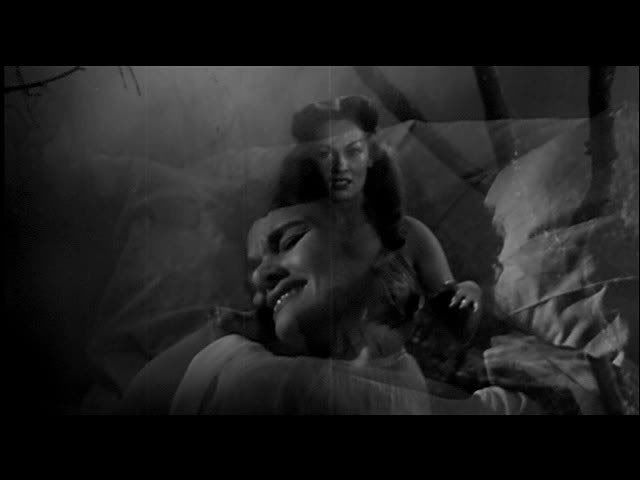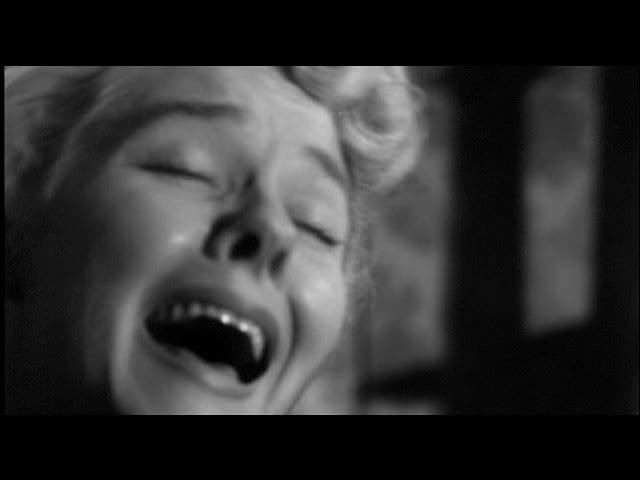
Daughter of Dr. Jekyll is a bizarre little slice of horror schlock, as rough and ragged as one would expect, by turns maddeningly dull and curiously compelling. The film signals pretty much right away what's in store, with an unabashedly cheesy opening in which a narrator summarizes the familiar legend of Dr. Jekyll and his monstrous alter-ego Mr. Hyde, while a haze-shrouded silhouette of Hyde himself slowly turns towards the camera, his hairy, warped visage grinning as a disembodied voice threatens the audience. It aims for creepy, but just about reaches hilarious instead. The rest of the film follows through on its horror premise with raw, low-budget enthusiasm. When Janet (Gloria Talbott) and her fiance George (John Agar) arrive at the country manor of her guardian Dr. Lomas (Arthur Shields), they find that the locals are overwhelmed by superstition and terrified of going out during the full moon. Soon enough, as bodies start to pile up in the surrounding woods, Janet learns that she is, of course, the titular daughter of Dr. Jekyll, and she begins to fear that her father's condition — he's inexplicably referred to as a werewolf here — has been passed on to her. Her fears only intensify, naturally enough, when she is plagued by horrible, violent nightmares and wakes up with her clothes torn and streaked with blood. As anyone familiar with horror conventions knows, anything so obvious must of course be dismissed as silly by George and the good doctor, who deny that there's anything wrong with Janet beyond simple (female) hysteria.
Director Edgar G. Ulmer has been acclaimed as a king of B-movies for his ability to inject a certain roughshod aesthetic sensibility into even the lamest of sub-B plots, and to the extent that he infuses this unbelievably weak scenario with some frisson of atmosphere, suspense, and even strange beauty, his reputation proves to be well-earned. There are long stretches of the film, particularly early on, that are really rough going, like everything involving the supposed romance between Janet and George; Agar seems positively bored and can't manage to suppress a smirk when delivering some of his generically reassuring dialogue. Talbott, at least, is competent, and what she lacks in acting chops she makes up for in sheer intensity and charisma. Her glaring black eyes give a certain credibility to the idea that she really is a "werewolf" or Hyde-like creature, even if one knows instinctively that she isn't. She especially shines in a series of dream sequences where Ulmer superimposes her sleeping face over scenes of moonlit stalking in the woods around the mansion. Janet dreams that she has transformed into a cold-eyed monster who hunts and kills young women before drinking their blood (because apparently the film's script also had to blend elements of vampire lore into its already confused monster). Ulmer finds blunt, bloody poetry in images like this, as he does in the rhythmic recurrence of shots of clouds passing across the moon, or in the soulful terror with which Janet stares into her mirror, caressing her cheeks as though expecting hair to sprout at any moment.

For the most part, Ulmer does a fine job of populating the film with enough memorable images like this that the otherwise shaky aesthetics (like the jittery, uncertain editing and laughably fake miniatures of the house and grounds) seem less important. Ulmer has no patience for the niceties of smooth plotting or transitions; he's only got a little over an hour to tell this story, and he seems determined to milk it for all the potent imagery it can yield, even if it means giving in to incoherence and silliness from time to time. The film's finest scene comes towards the end, during the monster's last nighttime raid, as it pauses to peer into a window at a sexy young woman changing into raunchy black lingerie. It's an unashamedly exploitative moment, one that's completely out of tune with the rest of the movie: in the midst of these desolate country back roads where all the locals have jagged teeth, dirty faces, and hard edges, suddenly the monster stumbles across this incongruous pin-up model who seems to be posing for a Playboy shoot. It's played for laughs with a knowing wink, but it just as quickly transitions into the film's most stunningly executed sequence, and in fact its only genuinely frightening one. As the monster advances on this young woman, Ulmer focuses only on her face in close-up, capturing her dawning recognition and a terror that finally erupts as a series of screams. As the attack commences, Ulmer maintains his fixed perspective, as the woman's face leans into the frame, her screams intensifying and the blurred motion of her face in close-up substituting for the unseen violence done against her body. The scene ends with a pan downward to see her limp hand sticking out from underneath a table, the rest of her body obscured from view. Ulmer pans right then, to catch a glimpse of her other hand and her stockinged leg sticking out from under the table on the other side; the scene's resolution is a dark mirror of the way the woman had earlier stuck out her leg alluringly to pull her stockings on.
Daughter of Dr. Jekyll is ultimately as silly and uneven as its title would suggest, punctuated by long stretches of utter boredom, but also possessing a sporadic sense of visual imagination and playfulness that is wholly unexpected in such an unpromising bottom-of-the-barrel genre piece. This is Ulmer's trademark, and while it may sound like faint praise to say that he spruces up such otherwise ratty material — like embedding tiny nuggets of gold in shit — his talents are far from insignificant. Rather, he manages to locate and magnify the virtues of whatever he makes, crafting moments of strange, unsettling genius in the midst of the most disposable films.







0Awesome Comments!